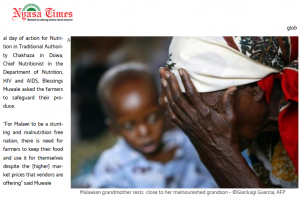Nutrition for children in Malawi
By Denis Kovalenko, Corporate Grant Manager, Save the Children It’s five in the afternoon in Lilongwe and my colleagues are setting off from Save the Children’s office after a busy day… June is winter here in Malawi and it gets dark early; the last rays of…
By Denis Kovalenko, Corporate Grant Manager, Save the Children
It’s five in the afternoon in Lilongwe and my colleagues are setting off from Save the Children’s office after a busy day…
June is winter here in Malawi and it gets dark early; the last rays of sun will be gone in just half an hour. The air is dry and cool.
It’s the harvest season and I see trucks carrying maize from the fields, some grains escape and ricochet against our windshield. But this apparent abundance of crop is deceiving. Food security here is fragile.
National emergency
The Government declared a national emergency earlier in the year following poor harvests caused by reduced rainfall. My colleagues in Lilongwe talk about El Niño being the primary cause.
According to Malawi’s Minister of Agriculture, Godfrey Chaponda, up to 8 million people – half the country’s population – are at risk of food insecurity. This raises serious concerns for nutrition.
The country has been falling behind in nutrition for some time now. 2014 Malawi MDGs Endline Survey showed that 42.4% of children under five were stunted. This is a slight increase compared to the UN’s Human Development Report that estimated that number at 47.8%.
Either way, this is nearly half of Malawi’s population.

We toured the country with partners CSNOA to raise awareness of malnutrition. This article appeared in the Nyasa Times on 3 July.
Stunting the future
The impact on social development can be devastating. Children are particularly vulnerable.
It’s now known that the effects of under-nutrition on children’s health, brain development, intelligence, educational attainment, and productivity in their first two years of life are significant and largely irreversible.
These effects reach beyond individual children and their households to community level.
Strong political will and sustained commitment to nutrition are both crucial. The government of Malawi has previously committed to increase nutrition spending in the national budget. But there’s no evidence suggesting that these commitments being fulfilled. In fact, due to the food crisis, cases of severe acute malnutritionjumped by 100% in just two months, from December 2015 to January 2016.
Working together for urgent action
To tackle the issue of malnutrition in a systematic and sustainable way, we’ve been working with our partner, Civil Society Organization Nutrition Alliance of Malawi (CSONA), at both national and district levels. The goal of this partnership has been two-fold:
- Budget advocacy: since 2015, we’ve been advocating for the Malawian government and donors at national and district levels to better funding nutrition. We carried out analyses of nutrition allocations in the Ministry of Health’s budgets for 2015/2016 and 2016/2017. In June, we presented our findings to the Parliamentary Committee on Nutrition to help them prepare for budget debate at Malawi’s National Assembly. The Committee’s members took the recommendations forward. Now CSONA is going to track whether these recommendations were reflected in the budget. Meanwhile, we’ve been working with CSONA to set up budget tracking committees in five districts
- Policy advocacy: we’ve also been working with partners to secure policy changes at the national level. This work is important to sustain political commitment to nutrition long-term. Specifically, we have been engaging with members of Parliament to bring in a National Nutrition Policy and Nutrition Bill. Both are drafts. This year, we trained 15 members of the Parliamentary Committee on Nutrition and HIV/AIDS to become Nutrition Champions. A number of them have since committed to drive nutrition accountability
What’s next?
Following the budget debate at Malawi’s National Assembly, CSONA will follow up with the champions in Parliament to see how far recommendations have been reflected in Ministry of Health’s budget.
It will be crucial to carry out budget analysis for the other four relevant ministries: Agriculture, Education, Gender (Children, disabilities and Social Welfare) and Local Government (including Rural Development).
Our target is a 0.3% increase in investment in nutrition by 2020. We’ll keep working with District Nutrition Coordinating Committees (DNCCs) and District Nutrition Civil Society Platforms in five districts (Mwanza, Nsanje, Zomba, Mchinji and Karonga) to prioritise nutrition in district plans and budgets and to monitor the use of nutrition resources.
If we’re going to effect policy change, it’s crucial for us to keep up our work with CSONA and Nutrition Champions to influence Malawi’s Parliament. The adoption of National Nutrition Bill, as well as costing and implementation of the National Nutrition Policy will be our key focus. CSONA has been asked by the Donor Group on Nutrition (DoNUTs) to sit on a United Nations Right to Food Steering Committee, which will give them a strong voice in policy dialogue and a chance to push for progress.
We have the opportunity to get children the nutrition they need in Malawi, but both government and donors must prioritise nutrition.
If government fulfils its commitments and partners support their efforts, Malawi will be able to progress on its sustainable development goals, making a brighter future for their children and the country.
This article was originally published by Save the Children: Click here to view the original post.